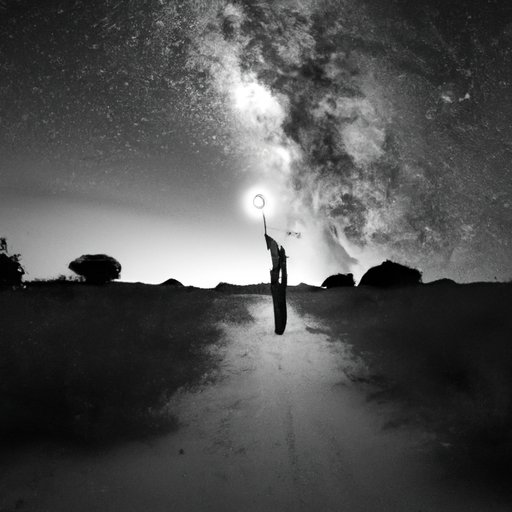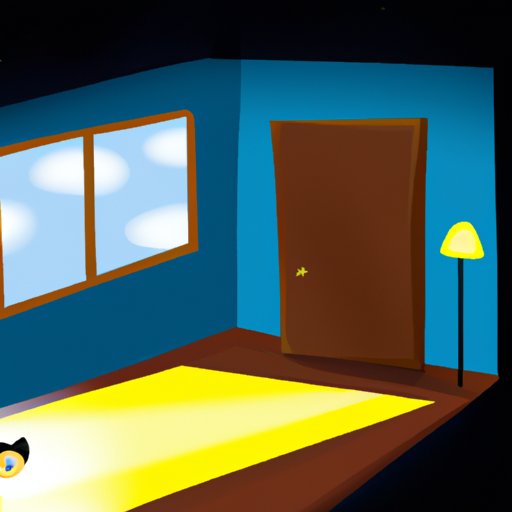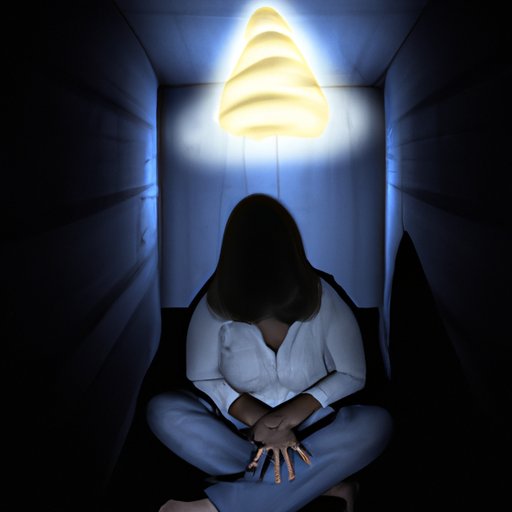Introduction
Most people are aware of their fear of the dark, although they may not be able to articulate it. Fear of the dark is a common phobia, also known as nyctophobia or scotophobia. It is an irrational fear of the unknown that can be caused by a variety of factors, including genetic predisposition, traumatic experiences, and anxiety disorders. In this article, we will explore the psychology behind fear of the dark, discuss the science behind it, and offer advice on how to cope with and treat this condition.
Exploring the Psychology Behind Fear of the Dark
Fear of the dark is one of the most common phobias among children and adults alike. It is a natural response to the unknown and can be caused by a variety of factors, including genetics, stressful events, or even a traumatic experience. It is important to note that fear of the dark is a normal part of development, and can usually be managed through cognitive behavioral therapy or other coping strategies.
Common Causes of Fear of the Dark
Fear of the dark can have many different causes, such as genetics, traumatic experiences, and anxiety disorders. In some cases, it can be linked to a person’s upbringing, or it can be triggered by a particular event. For example, if someone was scared during a power outage or storm, that could trigger a fear of the dark. Other common causes include childhood fears, nightmares, and even unfamiliar spaces.
Psychological Impact of Fear of the Dark
Fear of the dark can have a significant psychological impact on a person’s life. It can lead to feelings of unease and anxiety, difficulty sleeping, and avoidance of activities that involve darkness. In severe cases, it can cause panic attacks, night terrors, and a heightened level of stress. It is important to recognize the signs and symptoms of fear of the dark in order to effectively treat it.

How to Overcome Fear of the Dark Through Cognitive Behavioral Therapy
Cognitive behavioral therapy (CBT) is a type of psychotherapy that can help people overcome fear of the dark. It involves identifying negative thought patterns and replacing them with more positive ones. This type of therapy can help people understand their fears, develop coping strategies, and ultimately reduce their anxiety about the dark.
Understanding Cognitive Behavioral Therapy
Cognitive behavioral therapy is a form of psychotherapy that focuses on understanding and changing the thoughts and behaviors that lead to emotional distress. During CBT, a therapist will work with a client to identify and challenge irrational beliefs and replace them with more realistic and helpful ones. The goal of CBT is to help the client develop new coping skills and better manage their fear of the dark.
Practicing Cognitive Behavioral Strategies
In order to effectively manage fear of the dark, it is important to practice cognitive behavioral strategies. This includes avoiding avoidance behavior, learning relaxation techniques, and challenging irrational beliefs. It is also important to focus on positive thinking and set realistic goals. With practice, these strategies can help reduce fear of the dark and improve overall mental health.
Coping Strategies for Adults Who Are Afraid of the Dark
For adults who are afraid of the dark, there are several coping strategies that can help. These include setting boundaries and limits, developing a support system, and creating a positive mindset. Additionally, it is important to practice self-care and find ways to relax and reduce stress. By using these strategies, adults can learn to manage their fear of the dark and live a more fulfilling life.
Setting Boundaries and Limits
It is important for adults who are afraid of the dark to set boundaries and limits. This means avoiding situations that make them uncomfortable, such as going into dark places alone. It is also important to establish a bedtime routine and stick to it. This can help to reduce fear of the dark and make it easier to get a good night’s sleep.
Developing a Support System
Having a strong support system is key for overcoming fear of the dark. It is important to reach out to friends and family for support and talk about your fears. Talking to a professional therapist can also be beneficial. A therapist can provide guidance and help you develop coping strategies to manage your fear of the dark.
Creating a Positive Mindset
Creating a positive mindset is essential for managing fear of the dark. It is important to focus on the positives in life and be kind to yourself. Practicing mindfulness and meditation can help reduce stress and anxiety, which can in turn help to reduce fear of the dark. Additionally, it is important to take time to relax and do things that bring joy and pleasure.

The Science Behind Our Fear of the Dark
Our fear of the dark is rooted in our biology. When we are in a dark environment, our brain sends signals to our body to prepare for danger. This triggers a fear response in the brain, which activates the release of neurochemicals like adrenaline and cortisol. These chemicals prepare us for fight or flight, and can cause physical symptoms like increased heart rate and sweating.
Fear Response in the Brain
When we are in a dark environment, our brain sends signals to our body to prepare for danger. This triggers a fear response in the brain, activating the amygdala, hippocampus, and hypothalamus. These areas of the brain are responsible for fear, anxiety, and stress. As a result, the body releases neurochemicals like adrenaline and cortisol, which prepare us for fight or flight.
Neurochemical Reactions
The release of these neurochemicals can cause physical symptoms such as increased heart rate, sweating, and trembling. It can also lead to feelings of fear, anxiety, and panic. These reactions are a normal part of the fear response, but in some cases they can become overwhelming and interfere with daily life.
How to Help Children Who Are Scared of the Dark
Fear of the dark is common in children, and it is important to understand how to help them cope. Parents should be patient and understanding when dealing with a child who is scared of the dark. Some useful strategies include reassuring and comforting them, establishing routines, and exploring their feelings.
Reassuring and Comforting
It is important to reassure and comfort a child who is scared of the dark. This can be done by talking to them about their fears and letting them know that they are safe. It is also important to provide physical comfort, such as hugs, cuddles, and hand-holding. Lastly, parents should allow their children to express their emotions in a safe and supportive environment.
Establishing Routines
Establishing routines can help to reduce fear of the dark. This includes having a consistent bedtime and waking up at the same time each day. It is also important to create a calming bedtime ritual, such as reading a book or listening to soothing music. This can help to create a sense of security and reduce feelings of fear and anxiety.
Exploring Their Feelings
Exploring a child’s feelings is an important part of helping them cope with fear of the dark. This can be done by asking them questions about what scares them and why. Parents should also encourage their children to talk about their worries and offer reassurance and support. By doing this, parents can help their children to better understand and manage their fear of the dark.

How to Create a Safe and Comforting Environment to Reduce Fear of the Dark
Creating a safe and comforting environment can help to reduce fear of the dark. This includes encouraging exercise, reducing stress, and using calming aromatherapy. Additionally, it is important to keep the bedroom dark and free from distractions, such as electronics and bright lights. Creating a safe and comfortable environment can help to reduce fear of the dark and improve overall wellbeing.
Encouraging Exercise
Exercise is a great way to reduce stress and anxiety, which can help to reduce fear of the dark. Encouraging regular physical activity can help to boost mood and reduce tension. This can include activities such as walking, running, biking, swimming, yoga, and tai chi.
Reducing Stress
Reducing stress is essential for reducing fear of the dark. This can be done by taking breaks throughout the day, engaging in relaxing activities such as reading or listening to music, and avoiding stressful situations. Additionally, it is important to get enough sleep, eat a balanced diet, and practice deep breathing exercises.
Using Calming Aromatherapy
Aromatherapy is a great way to reduce stress and create a calming atmosphere. Essential oils can be used to create a pleasant scent in the bedroom. Some calming scents include lavender, chamomile, and ylang-ylang. Diffusing these oils in the bedroom can help to reduce fear of the dark and create a peaceful environment.

How to Use Light Therapy for Treating Fear of the Dark
Light therapy is another option for treating fear of the dark. This type of therapy uses bright light to reduce anxiety and increase serotonin levels. It is often used in combination with other treatments, such as cognitive behavioral therapy, to help reduce fear of the dark. Light therapy can be done at home or with a therapist, and it has been shown to be effective in reducing fear of the dark.
Understanding Light Therapy
Light therapy is a type of treatment that uses bright light to reduce anxiety and increase serotonin levels. It can be done at home or with a therapist, and it is generally safe and non-invasive. The light is usually administered for 30 minutes to one hour per day, and it is important to wear protective eyewear while receiving the treatment.
Benefits of Light Therapy
Light therapy can help reduce fear of the dark by increasing serotonin levels and reducing anxiety. It can also help to improve sleep, reduce stress, and improve mood. Additionally, it can help to reduce the intensity of fear responses and create a feeling of calmness and relaxation.
Conclusion
Fear of the dark is a common phobia that can have a significant psychological impact on a person’s life. It can be caused by a variety of factors, including genetics, traumatic experiences, and anxiety disorders. There are several treatment options available, such as cognitive behavioral therapy, coping strategies, and light therapy. These treatments can help to reduce fear of the dark and improve overall mental health.
(Note: Is this article not meeting your expectations? Do you have knowledge or insights to share? Unlock new opportunities and expand your reach by joining our authors team. Click Registration to join us and share your expertise with our readers.)
